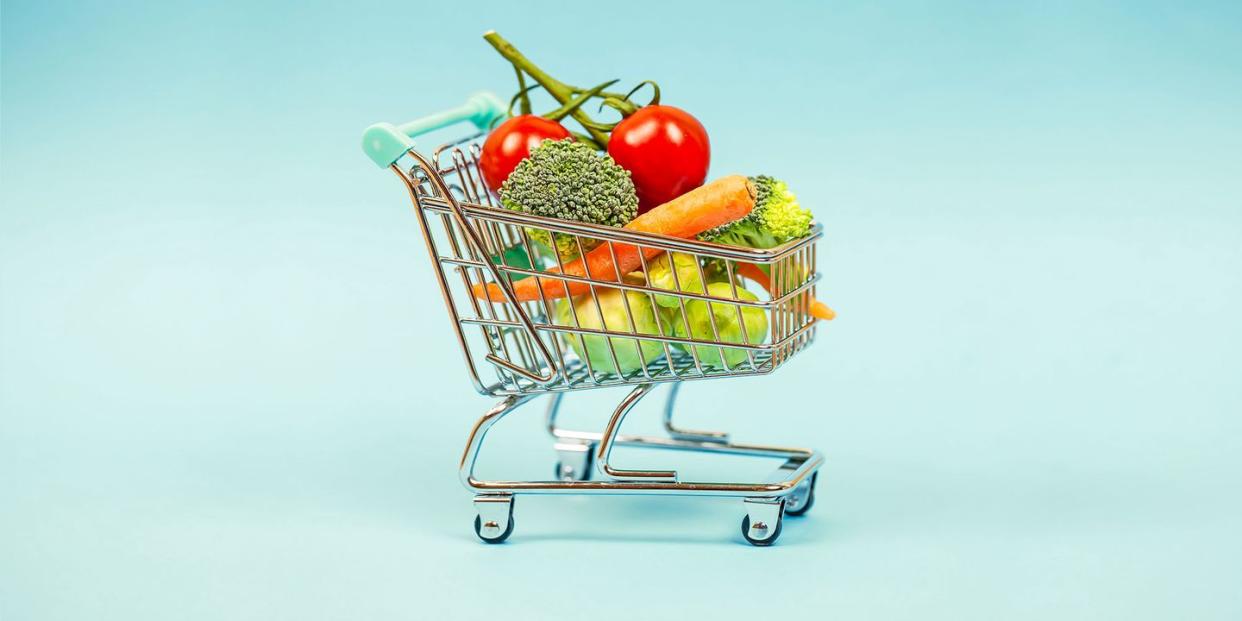How to Grocery Shop Safely During the Coronavirus Outbreak

As more information about the coronavirus pandemic develops, some of the information in this story may have changed since it was last updated. For the most up-to-date information on COVID-19, please visit the online resources provided by the CDC, WHO, and your local public health department.
On Sunday, the White House advised that everyone should put a pause on running errands unless it's absolutely necessary. The spread of COVID-19 in the U.S. is expected to peak in the next two weeks, which means it is crucial to avoid going to the pharmacy or the grocery store if possible.
If you are running low on food, the best option is grocery delivery. But if you absolutely must make a store run, it's important to wear a face covering and practice social distancing and proper hygiene.
Remember: Being prepared does not mean stockpiling or hoarding groceries.
Whether you choose to shop online or head out to the supermarket, here are the best tips for conscious and safe grocery shopping:
If you're planning on ordering your groceries...
Ask your delivery person to leave the groceries outside your door. "If contact-less delivery of groceries or meals is available, opt for it," says Dr. Chris J. Wiant, MPH, Ph.D., Chair of the Water Quality and Health Council. It's possible that either you or your delivery person is a carrier of the COVID-19 virus so it's best to keep contact to a minimum. Some services have sections where you can specify how you would like your groceries to be dropped off so, tell the delivery people to leave them outside.
If you plan on giving the delivery person a tip, see if you can tip electronically instead of handing out cash.
And always make sure to wash your hands before and after you pick up the groceries from your doorstep. The CDC recommends washing your hands with soap and water for at least 20 seconds. Although researchers say the risk of contracting the virus from contaminated surfaces — such as bags and packaging — is low, it's better to be safe than sorry.
If you are planning on going to the store...
Go when it's not crowded. Since the virus is mainly transmitted through close contact with other individuals, the key to social distancing is by avoiding large groups of people. But if you don't get your timing right and find yourself at the grocery store with a lot of people, get what you need and leave. Don't dally. If you see your friends or family give them a wave or a nod. Speak to them from a distance (experts say at least six feet) or FaceTime them at another time. Avoid hugs and handshaking.
Cover your mouth and nose. The CDC is now advising that people wear face coverings such as bandanas, a balaclavas, scarfs, or DIY cloth face masks. Surgical masks are also effective if you currently have them but they are not necessary; don't feel like you need to go order them online.
Bring sanitizing wipes with you so you can clean any shopping carts or baskets you use. Gloves will not be of much use here because if your gloves touch a contaminated product, they will just contaminate the next thing that is touched. Just shop with caution, and avoid touching your face, eyes, and nose as you walk about the store. "Use hand sanitizer after going through the checkout," Dr. Wiant advises.
How to handle your groceries once you get them:
You should disinfect all nonporous containers: We're talking about food packaging such as cans, bottles, and jars — glass, metal, plastic etc. You can use your everyday disinfectant wipes or create your own dilute chlorine bleach solution. To make that, the CDC suggests mixing 1/3 cup of bleach per gallon of water or 4 teaspoons of bleach per quart of water. Wipe your containers with this solution and let it sit for one minute on the surface until you dry it off.
The food safety rules when it comes to eating fresh fruits and veggies haven't changed: Just run them under the faucet and use clean hands to rub off any soil or dirt. Soap is not necessary since many soaps are harmful to ingest. Plus there is very little evidence that a respiratory disease is transmitted through produce.
After you've put away all of your groceries, disinfect all of the surfaces that your bags have touched. Generally, it's a good practice to clean surfaces after any sort of use.
The bottom line: Experts say that it is extremely important for people stay home over the next two weeks in order curb the spread of the corona virus. Only go out to shop if you absolutely must. Let's all do our best to flatten the curve and keep each other safe.
You Might Also Like


